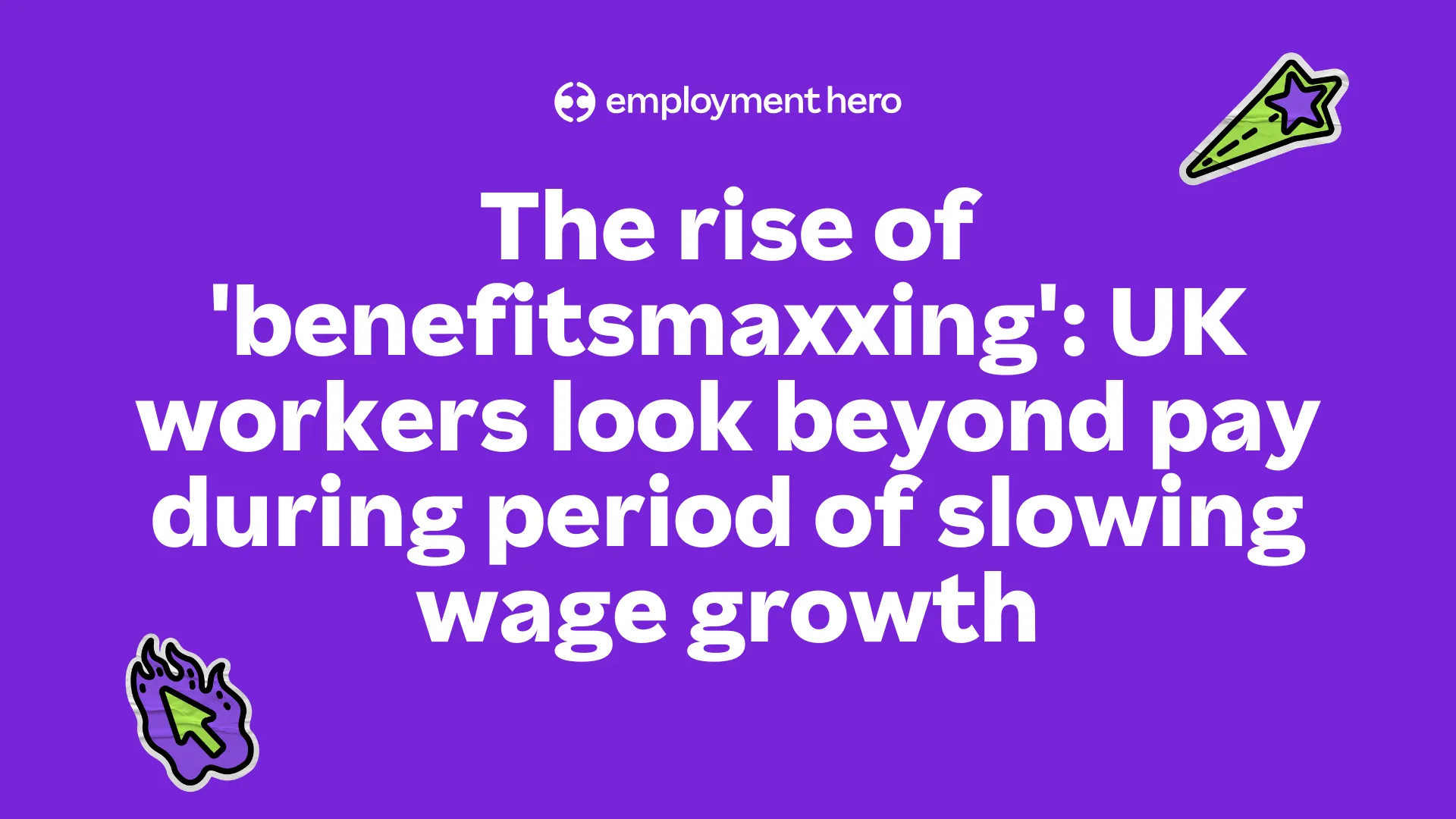Managing public holidays and business closures over the holiday season
Are you ready for the holiday season? Learn all about managing public holidays and business closures over the holiday season as an employer.

Contents
Although a busy time of year, it’s important employers are aware of their legal obligations around public holidays, and the rules that apply if you want to close your business down during the festive season.
Business owners may not be aware that it isn’t always possible to implement a forced closedown and that there are various rules that have to be followed to do this lawfully. Annie shares everything you need to know.
Annie Pellizzon is our HR Advisory Manager at Employment Hero, overseeing our HR advisory team and working directly with businesses to help them navigate the complexities of Australian employment. With over 7 years experience in HR, Annie is passionate about ensuring employers have the support they need to maintain compliance.
Disclaimer: The information in this article is current as at 24 October 2024, and has been prepared by Employment Hero Pty Ltd (ABN 11 160 047 709) and its related bodies corporate (Employment Hero). The views expressed in this article are general information only, are provided in good faith to assist employers and their employees, and should not be relied on as professional advice. The Information is based on data supplied by third parties. While such data is believed to be accurate, it has not been independently verified and no warranties are given that it is complete, accurate, up to date or fit for the purpose for which it is required. Employment Hero does not accept responsibility for any inaccuracy in such data and is not liable for any loss or damages arising either directly or indirectly as a result of reliance on, use of or inability to use any information provided in this article. You should undertake your own research and to seek professional advice before making any decisions or relying on the information in this article.
Public holidays
What days are considered a public holiday?
The Fair Work Act 2009 (Cth) (FW Act) sets out the key public holidays at a national/federal level, but also recognises that there can be other days declared by a State or Territory as a public holiday, or as a substituted public holiday.
The following days are national public holidays under the FW Act:
- 1 January (New Year’s Day);
- 26 January (Australia Day);
- Good Friday;
- Easter Monday;
- 25 April (Anzac Day);
- King’s birthday holiday (the day on which it is celebrated in a State or Territory or a region of a State or Territory);
- 25 December (Christmas Day);
- 26 December (Boxing Day);
- any other day or part-day declared or prescribed by or under a law of a State or Territory to be observed generally within the State or Territory (or a region of the State or Territory) as a public holiday.
If one of the days recognised as a public holiday is substituted for a different day in a State or Territory, then it is the substituted day which is recognised under the FW Act.
It is important to ensure you check any relevant state legislation for any additional or regional holidays which may apply, as these can vary. A full list of national & state-based public holidays can be found here and this is routinely updated from time to time.
Modern awards and enterprise agreements may also supplement the public holidays provided for in the FW Act, so it is important to check these too.

Can I agree with employees to substitute another day as a public holiday?
Yes. For both award-covered and award-free employees it is possible to agree with an employee that the designated public holiday is treated like a normal day, and that another day is treated like a public holiday instead.
For example, the public holiday may fall on a Monday, but you agree with staff to treat the Tuesday as a public holiday instead. This would generally mean that employees working on Monday would be paid as normal and employees would be entitled to have Tuesday off (or be paid public holiday rates if required to work, see below).
Are my employees entitled to be absent on a public holiday?
The FW Act outlines the basic provision under section 114 that an employee is entitled to be absent from work on public holiday. However, an employer can still request an employee to work on a public holiday, but only where that request is reasonable.
An employer can only require an employee to work a public holiday after a request has been made and where an employee’s refusal of such request is unreasonable. But in all cases, the employee needs to be requested to work first (which they have an opportunity to accept or refuse), an employer cannot simply require an employee to work without first making the request.
What is considered reasonable and unreasonable?
The FW Act provides for several factors that must be taken into consideration for whether a request to work on a public holiday is reasonable or unreasonable (and when a refusal to work would be reasonable or unreasonable). Generally, these factors are specific to the operational needs of the business, and the personal circumstances of the employee. The relevant factors are:
- The nature of the employer’s workplace or enterprise (including its operational requirements), and the nature of the work performed by the employee;
- The employee’s personal circumstances, including family responsibilities;
- Whether the employee could reasonably expect that the employer might request them to work on the public holiday;
- Whether the employee is entitled to receive overtime payments, penalty rates or other compensation for, or a level of remuneration that reflects an expectation of, work on the public holiday;
- The type of employment of the employee (for example, whether full-time, part-time, casual or shiftwork);
- The amount of notice in advance of the public holiday given by the employer when making the request;
- The amount of notice in advance of the public holiday given by the employee when refusing the request; and
- Any other relevant matter.
An employee can only decline a request to work where reasonable (for example on the basis of their personal circumstance such as caring responsibilities).
However, where a business is routinely open on a public holiday and has also provided advance notice that it will need employees to work (for example, if this was made clear when the employee was offered the role), it will usually be reasonable to request employees to work (and unreasonable for them to refuse).
Are employees entitled to payment if they are absent on a public holiday?
The basic position under the FW Act is that if a full-time or part-time employee is absent from work on a public holiday, and they would have ordinarily worked on that day, they are to be paid their base rate of pay for the ordinary hours they would have worked.
However, the FW Act makes clear that if the regular hours of a part-time employee do not include the day of the week the public holiday falls, they will not be entitled to payment. Casual employees are also not entitled to be paid when not rostered for a public holiday.
Importantly, modern awards and enterprise agreements can provide for more favourable conditions than these, and as such it is important to refer to the relevant award or agreement that covers your employees.
Some awards state, for example, that an employee must be paid for absence on a public holiday even if it falls on their rostered day off. This is a feature of the Hospitality Industry (General) Award which states:
35.3 Additional public holiday arrangements for full-time employees
- An employer must, if the rostered day off or accrued day off of a full-time employee falls on a public holiday, do one of the following:
(i) pay the employee an extra day’s pay; or (ii) give the employee an alternative day off within 28 days; or (iii) give the employee an additional day’s annual leave.
What do I pay employees if they work a public holiday?
Modern awards and enterprise agreements will usually set out any rules and additional entitlements for employees that perform work on a public holiday. Typically, this will incur a higher rate of pay for all hours worked on a public holiday (e.g. 250% of the usual rate of pay).
However, it is important to always check the relevant award, enterprise agreement or contract to ensure you understand the additional entitlements employees must be provided.
For award-free employees, it will generally be a question of agreement between the parties as to how the employee is compensated for public holiday work (e.g. is this factored into their salary already, do they receive time off in lieu, do they get extra payment, etc).
How does a public holiday impact an employee taking annual leave or personal/carer’s leave (“Sick Leave”)?
The entitlement to public holidays is separate from an employee’s entitlement to personal leave and annual leave. This means if a public holiday falls on a day where an employee is on a period of annual leave or paid personal leave (and the employee would ordinarily have worked on that day), they still must be paid for the public holiday and it does not reduce their annual leave or personal leave balance.
It is important to note that the above only applies for periods of paid leave (i.e. it wouldn’t apply to employees who are on a period of unpaid leave).

Closing down over the holidays
Can I close down my business over the Christmas and New Years period?
It is common for a business to decide to schedule a break or temporary business closure over the holiday period. Generally, employers will want permanent staff to take a period of annual leave to cover their ordinary hours during this break.
However, this arrangement is not always permitted by the law, and the terms of any applicable modern award (or enterprise agreement) will need to be consulted, to work out if this is allowed and the process to follow.
Award-free employees
If no award (or enterprise agreement) applies, then the FW Act says that an employee can be required to take annual leave where the requirement is reasonable. So long as an employee is given a reasonable amount of notice of the close down, and of the need to take annual leave, there should be no issue in requiring them to take annual leave during this period.
If an award-free employee does not have sufficient leave accrued an employer can not direct an employee to take unpaid leave, this would need to be done by agreement.
Another alternative would be to grant annual leave in advance to permanent employee who doesn’t have enough leave accrued to cover the break. Again, this would need to be done by agreement. The risk for employers is if the employee’s employment then ends with the employee still in a negative leave balance. Employers would not be able to deduct payment for this from an employee’s final wages without their agreement (contrast some award-covered employees, see below).
In extreme circumstances, therefore, an employer may have to pay an employee for their absence during an annual shutdown if no agreement on taking unpaid or being provided leave in advance can be reached.
A practical way to avoid this happening is to ensure that employees always have enough leave accrued to cover the break (see further below).
Employees covered by a modern award
Many modern awards provide an ability for an employer to implement a temporary “shutdown” or “closedown” in the business, however some do not.
For example, the Social, Community, Home Care and Disability Services Award (“SCHADS Award”) does not allow employers to direct a shutdown and require employees to take annual leave during this period. It would therefore only be possible to get permanent employees to take annual leave during this period by agreement.
On the other hand, the Clerks Private Sector Award (“Clerks Award”) does provide for employers to have a temporary shutdown and require permanent employees to take annual leave, so long as they are given at least 28 days’ written notice.
Where an employee does not have sufficient annual leave accrued to cover the break, the Clerks Award says employers and employees can agree for the employee to be provided annual leave in advance and a deduction can be made from their final pay if they are still in a negative leave balance when their employment ends. Importantly, an employee is under no obligation to agree to take annual leave in advance.
Neither the Clerks Award, nor any other modern award, allows an employer to require a permanent employee to take unpaid leave if they don’t have sufficient leave to cover the break, this would need to be done by agreement (see further below).
How does this work in practice?
Employer 123 is covered by the Clerks Award and has provided the required 28 days written notice of an annual temporary shutdown period to its employees. The temporary shutdown will be 2 weeks over the Christmas and New Year period.
- Employee Sam Smith has 3 weeks annual leave accrued. Employer 123 can direct him to take 2 weeks of annual leave during the temporary shutdown period.
- Employee Natalie Wu has 4 days annual leave accrued. Employer 123 can direct her to take 4 days of annual leave during the temporary shutdown period.
- Employee John Doe has no accrued annual leave. Employer 123 cannot direct him to take unpaid leave or leave in advance to cover the temporary shutdown period.
For John Doe and Natalie Wu, Employer 123 has options including:
- Seek written agreement from John Doe and Natalie Wu to take annual leave in advance (in accordance with the relevant provisions in the Clerks Award) or to take unpaid leave for the relevant shut down period in which they do not have sufficient annual leave to cover.
- Direct John Doe and Natalie Wu to not attend work during the temporary shutdown period and pay their wages as normal.
- Direct John Doe and Natalie Wu to continue to work during the temporary shutdown period and pay their wages as normal.
Can I refuse annual leave requests during the year to ensure employees have enough accrued annual leave to cover a shutdown?
Annual leave requests can only be refused where reasonable, as per section 88 of the FW Act. This applies to both award-free and award covered employees. The Fair Work Commission has specifically commented on denying annual leave requests in this context. It said this:
On the working assumption that a shutdown period would in most cases be two weeks or less (except for some industry sectors with special characteristics) and would typically occur during the Christmas/New Year period, any employee with 6 months or more of service is likely to have accrued sufficient annual leave to cover the shutdown period. Some employer submissions have expressed a concern about employees using up their annual leave entitlements during the course of the year prior to the shutdown occurring, but we consider that s 88 of the FW Act provides sufficient scope for employers to manage employee annual leave requests so that employees have sufficient accrued leave to cover a shutdown period. In particular, where it is an established feature of an employer’s business, or a relevant part of it, to shut down in the Christmas/New Year period, it would be unlikely that a refusal to agree to a leave request which would leave the employee with insufficient accrued leave to cover the shutdown period would be unreasonable within the meaning of s 88(2) unless there were some strong countervailing factors pertaining to the individual concerned.
It therefore seems likely that in most situations employers will be able to refuse annual leave requests to ensure employees have sufficient leave to cover an annual shutdown. We consider it would be prudent to refer to the expectation that leave will be taken during the shutdown in information given to employees prior to commencement of employment e.g. in their employment contract, letter of offer or relevant workplace policy, and to continue to emphasise this throughout employment.
What about casual employees?
Annual closedown provisions will only apply to permanent employees, as they deal with how an employer directs leave over this time. As casual employees do not receive paid annual leave, and do not have set hours of work, employers can opt to simply not roster casual staff over the business closure period, and are not required to have provided any certain amount of prior written notice. Casuals are also not paid for absence on public holidays.
Need further help? Consider our HR advisory service.
If you need further guidance around managing your employer obligations around public holidays or Christmas closures, reach out to the HR Advisory team today.
If you’d like more information on how Employment Hero can support your business, reach out to one of our business specialists today.
Related Resources
-
 Read more: The rise of ‘benefitsmaxxing’: UK workers look beyond pay during period of slowing wage growth
Read more: The rise of ‘benefitsmaxxing’: UK workers look beyond pay during period of slowing wage growthThe rise of ‘benefitsmaxxing’: UK workers look beyond pay during period of slowing wage growth
February 26 2026: New research commissioned by Employment Hero reveals 53% of UK workers say better benefits are a factor…
-
 Read more: Employment Hero Named Among Best Australian & New Zealand Companies by G2
Read more: Employment Hero Named Among Best Australian & New Zealand Companies by G2Employment Hero Named Among Best Australian & New Zealand Companies by G2
Ranked #6 on G2’s 2026 Best Software Awards, officially a Top 10 software company in ANZ
-
 Read more: Employment Hero Named Among Best Australian & New Zealand Companies By G2
Read more: Employment Hero Named Among Best Australian & New Zealand Companies By G2Employment Hero Named Among Best Australian & New Zealand Companies By G2
Employment Hero has been ranked #6 on G2’s 2026 list of the Best Australian and New Zealand Companies.
























